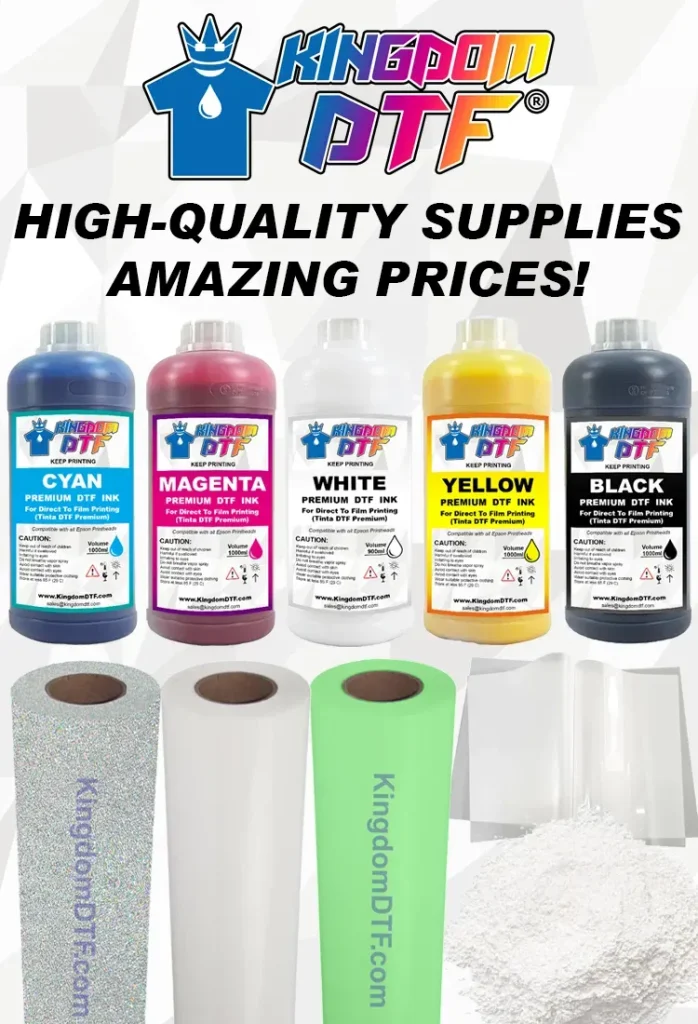DTF supplies for professionals have revolutionized the textile printing landscape, offering a blend of quality, convenience, and sustainability. As Direct-to-Film (DTF) printing rises in popularity, it becomes essential for professionals to have access to high-quality DTF printers, specialized DTF inks, and premium DTF transfer films. These supplies not only streamline the printing process but also enhance the vibrancy and durability of the final products. Furthermore, incorporating effective heat press machines guarantees that designs adhere flawlessly to various fabrics, ensuring optimal results. By selecting eco-friendly printing supplies, professionals can also significantly reduce their environmental impact, creating stunning prints while aligning with sustainable practices.
In the realm of textile production, the supplies necessary for Direct-to-Film (DTF) printing have gained considerable recognition among printing experts. These high-performance materials include advanced printers tailored for film application, vibrant inks that adhere well to fabrics, and specially engineered films that help achieve sharp and clear prints. Modern heat press machines play a pivotal role in this process, allowing for even application of heat and pressure necessary for effective transfers. Moreover, an emphasis on sustainable practices leads many professionals to seek eco-conscious printing options, ensuring that their operations are both productive and environmentally responsible.
Understanding the Essentials of DTF Printers
Selecting the right DTF printer is paramount for achieving stunning prints that captivate your audience. DTF printers such as the Epson SureColor and Brother GTX series are renowned for their precision and ability to render vibrant colors. These machines utilize cutting-edge inkjet technology specifically designed for direct-to-film printing, which significantly enhances print quality and longevity. It’s essential for professionals to consider these options to ensure their output stands out in a competitive market, effectively capturing the essence of their designs.
Investing in a reliable DTF printer not only boosts performance but also minimizes common issues such as clogging and uneven ink distribution. This is imperative for maintaining high-quality prints. Additionally, as manufacturers continue to innovate, newer models come equipped with features that improve workflow efficiency, reduce downtime, and streamline the printing process. Consequently, when professionals choose DTF printers, they are not simply buying a machine; they are investing in the success of their print business.
The Impact of Quality DTF Inks on Printing
The selection of DTF inks significantly influences the overall print quality and durability of the finished product. High-grade DTF inks from brands like Kornit and iColor offer unmatched vibrancy and excellent adhesion to various fabrics. These inks are formulated to minimize issues like bleeding during the transfer process, resulting in clean and precise designs. For professionals eager to enhance their branding, using superior DTF inks is crucial as it contributes to a more professional appearance of their textiles.
Moreover, the market is witnessing a surge in environmentally friendly DTF inks, aligning with the industry’s shift towards sustainability. Eco-solvent inks provide professionals with a dual benefit: they maintain high-quality outputs while reducing environmental impact. Opting for such sustainable inks not only appeals to eco-conscious customers but also positions businesses as forward-thinking entities in the textile industry.
Choosing the Right Transfer Films for Optimal Results
The choice of transfer films plays a critical role in the success of DTF printing. Quality films, such as those produced by AYTAC and Hotronix, facilitate excellent adhesion to garments, ensuring that intricate details are preserved during the transfer process. A premium transfer film enhances the clarity and fidelity of the designs, allowing for vibrant and durable prints that hold up against wear and washing. Thus, professionals must prioritize the selection of high-quality transfer films to achieve the best results.
Furthermore, different fabrics may require specific types of transfer films to maximize print performance. Understanding the compatibility of transfer films with various substrates can lead to superior outcomes. Professionals should consider testing different films to determine which yields the best results for their unique application, ultimately enhancing customer satisfaction with the quality of the printed garments.
The Role of Adhesives in DTF Printing Success
Adhesives are a crucial element in the DTF printing process, particularly powder adhesives such as DTF Transfer Powder that ensure a seamless transfer from film to fabric. The application of high-quality adhesives allows for smooth and accurate transfers without compromising the texture of the garment. This is essential for maintaining the quality of the print and delivering a professional product that meets client expectations.
Proper distribution of adhesive also plays a significant role in achieving consistent print results. Professionals need to be meticulous about how they apply adhesive, as uneven distribution can lead to patchy prints or poor adherence. By investing in reliable adhesive products and mastering the application technique, printers can substantially improve their print quality, culminating in a delightful experience for end-users.
Importance of Quality Heat Press Machines in DTF Printing
Heat press machines are indispensable in the DTF printing process, as they ensure that the transfer adheres properly to the fabric. High-quality heat presses like the Geo Knight DK20S provide uniform temperature distribution and consistent pressure, which are vital for achieving successful transfers. When professionals utilize robust heat presses, they minimize the risk of printing issues such as incomplete adhesion or fading colors.
Moreover, advanced heat press machines often come with heating timer and pressure settings that can be adjusted to cater to various material types. This versatility allows professionals to experiment with a range of fabrics and designs confidently. Investing in a state-of-the-art heat press is, therefore, essential for any DTF professional aiming to elevate their printing capabilities and produce high-quality results that stand the test of time.
Navigating DTF Printing Trends and Innovations
The DTF printing landscape is continuously evolving, influenced by innovations that enhance both the quality and efficiency of the process. Manufacturers are frequently updating their product offerings, launching new formulations of DTF inks and powders that promise improved durability and vibrancy. To remain competitive, professionals should stay informed about these developments and regularly assess how they can incorporate the latest technologies into their printing practices.
Additionally, the rising emphasis on sustainability within the industry is prompting professionals to consider eco-friendly printing supplies. Embracing these innovative materials not only addresses environmental concerns but also appeals to a growing segment of consumers who prioritize sustainable practices. By aligning their operations with these trends, businesses in the DTF printing sector can establish a more responsible brand image that resonates with modern consumers.
Frequently Asked Questions
What are the best DTF printers for professionals?
Choosing the right DTF printer is crucial for high-quality outcomes. Popular models like the Epson SureColor and Brother GTX series are highly recommended as they provide exceptional color precision and print clarity, ideal for professional-grade DTF printing.
How do DTF inks affect print quality?
DTF inks play a significant role in the final print quality. High-grade DTF inks from brands like Kornit and iColor are known for their vibrant colors and excellent fabric adhesion, minimizing issues such as bleeding during the transfer process.
What types of DTF transfer films should professionals use?
Professionals should opt for clear DTF transfer films from reputable brands like AYTAC and Hotronix, as these offer superior adherence and clarity, ensuring that designs come out crisp and vivid on various fabrics.
What are the benefits of using eco-friendly DTF supplies?
Eco-friendly DTF supplies, such as sustainable inks and materials, help reduce environmental impact while maintaining print quality. Many professionals are now making the switch to these eco-friendly options to align with sustainability practices in the industry.
What role do heat press machines play in DTF printing?
High-quality heat press machines, like the Geo Knight DK20S, ensure uniform heat distribution, which is vital for proper adhesion of DTF transfers onto fabric. This reliability is essential for achieving optimal print quality and durability.
How can professionals stay updated on new DTF printing trends?
To keep up with the latest trends in DTF printing, professionals should engage in ongoing education and training through workshops, online resources, and industry publications that highlight innovations in DTF supplies and techniques.
| Key Supplies for DTF Printing | Details | |
|---|---|---|
| Printer Selection | Opt for DTF printers like Epson SureColor and Brother GTX for vibrant colors and precision. | |
| Inks | Use high-grade DTF inks from brands like Kornit and eco-solvent inks for sustainability. | |
| Transfer Films | Choose clear DTF films from AYTAC and Hotronix for crisp and vivid designs. | |
| Adhesives | Opt for high-quality powder adhesives for smooth transfers without texture loss. | |
| Heat Press Machines | Invest in professional-grade heat presses like Geo Knight DK20S for reliable results. | |
Summary
DTF supplies for professionals are essential for those aiming to enhance their printing quality. The DTF printing process greatly benefits from the right selection of printers, specialized inks, transfer films, adhesives, and heat presses. By choosing quality brands and staying informed on industry trends such as sustainability and innovations, professionals can significantly improve their output and efficiency. As technology advances, understanding the best supplies available allows for better adaptation to the market demands, ensuring that businesses lead in quality and creativity.

